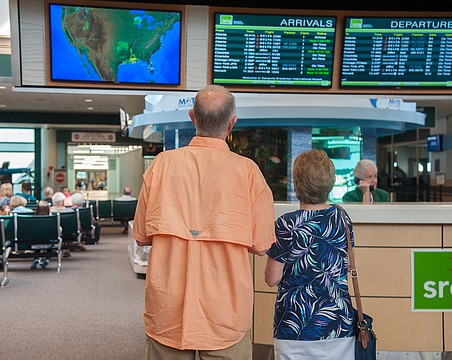Coffee Talk (9/26/03)
Mum remains the word
Still on the possible-Republic-Bank-buyout trail, Coffee Talk bumped into Provident Bank's Florida chief, Tramm Hudson, last week. Hudson's bank is soon to be converted to RBC Centura, to reflect its new ownership, Royal Bank of Canada. Asked when RBC is going to buy St. Petersburg-based Republic Bank, Hudson replied: "You know I can't comment on things like that."
A Coffee Talk bank source says watch for a bidding contest for Republic, but at this point, CT's source says he would lean toward RBC ($160 billion, assets) outbidding another hungry buyer, North Carolina's BBT ($85 billion, assets).
Will the bidding reach three times book value? Probably not, says CT's source. The price is likely to be closer to two and a half times book - that is, if Republic's board sells.
RBC in and Provident jobs out
Talking about banks, expect to see Provident Bank signs replaced with RBC (Royal Bank of Canada) signs before Thanksgiving. RBC Financial Group, based in Canada, is the seventh largest bank in North America. The bank's purchase of Provident is being done through its American company, RBC Centura in North Carolina. On Sept. 12, the Federal Reserve approved the conversion and sale. Now the bankers are planning the practical, customer-side of the transition from Provident to RBC.
"Over the Nov. 22 weekend, we plan to change the signs, pull the switch and change from the Provident computer to the RBC computer," says Tramm Hudson, executive vice president of Provident in Sarasota. "Hopefully it will be seamless for customers."
Provident and RBC are trying to find "redeployment opportunities" for some staff - i.e., trying to find them jobs. RBC also purchased Admiral Bank on the east coast of Florida, a bank with $500 million in assets and 11 offices. RBC will consolidate Admiral's operations with those of Provident, which has $750 million in assets and 13 offices. By definition, that consolidation will change personnel needs.
On the plus side, says Hudson, RBC has higher branch personnel staffing requirements than Provident, so some jobs may open up in banks. "There are five members in each Provident branch, but RBC requires eight or more personnel in their branches."
Location, location, location
Greater Naples Chamber of Commerce President Michael Reagen, chief of that organization for about a year and a half, says one of his organization's most valued assets is its visitor center's location on tony Fifth Avenue in downtown Naples.
Reagen reports 156,000 people visited the center in a recent 12-month period, with the visitors coming from 36 states and 63 countries. That number, by the way, was down from 176,000 prior to Sept. 11, 2001.
Contrast those figures with, say, the Sarasota Visitors Center, whose location on Tamiami Trail is on one of the city's most traveled streets but not in a popular shopping district. Annual traffic there: 100,000 a year.
Also worth noting: Collier County's 2003 tourist traffic is estimated to reach 2.8 million visitors; Sarasota's: 1.9 million.
Which airport controversy?
A seemingly innocent question like "what are they going to do with that airport?" should be answered carefully in Pinellas County these days. Government officials are confronted with not one but two airport brouhahas enflaming local passions.
In St. Petersburg, city officials are caught between downtown development proponents and the St. Petersburg Times, which want to rid the waterfront of Albert Whitted Municipal Airport, and general-aviators who hope to preserve the tiny airfield.
Farther north, county commissioners have been taken aback by vociferous opposition from Feather Sound and other affluent precincts to a proposed $223 million expansion of St. Petersburg-Clearwater International Airport. The commissioners were pilloried again by jet noise-adverse residents at a Sept. 17 forum in Clearwater at Countryside High School.
St. Petersburg Mayor Rick Baker seems to be handling his airport dilemma a whole lot better than Pinellas County Administrator Steve Spratt is dealing with his.
Baker would like to split the difference and close one of Whitted Airport's two runways. That way, at least some semblance of an airport remains while the discontinued runway could be claimed for development and a public park. A city consultant has opined that Baker's idea is viable. St. Petersburg voters are expected to get their say via referendum in the November city election.
Spratt is still recovering from an August shout-fest that would have impressed Jerry Springer's producers. A conference room booked at a local motel, everybody now agrees, was too small for the 250 or so residents who showed up. The meeting degenerated into chaos as residents rudely protested the brusque manner of a county consultant who ran it.
Want a little aviation controversy? You have your pick in Pinellas.
Immigration law changes
If you hire engineering or technology employees from foreign countries and bring them to the United States on three-year H-1B work visas, pay attention. Sarasota immigration lawyer Chris Jaensch told Coffee Talk some important legal changes are about to affect those visas.
A few years ago, the federal government temporarily increased the number of H-1B visas, a three-year work visa used for educated professionals and recent foreign college graduates, to 195,000 new visas issued per year. Along with that increase came a mandate that for every H-1B visa a U.S. employer obtained, it paid $1,000 toward a fund to retrain U.S. workers.
But the increase is about to end. As of October 1, the new fiscal year for the federal immigration department, once called INS and now named BCIS, the Bureau of Citizenship and Immigration Services, the number of new H-1B visas issued by the government each year drops to 65,000. Moreover, says Jaensch, there are still 22,000 applications for H-1B visas still pending and they may be counted against the 65,000 available, leaving only 43,000 visas available for issue until Oct. 1, 2004.
One positive note: when the number of available visas reverts, the $1,000 employer fee also disappears. The law only affects new H-1B visa applicants, not current H-1B visa holders seeking renewals or extensions. Congress is currently conducting hearings to change the reversion, but Jaensch says nothing will happen until October.
Last year, the federal government approved approximately 103,000 new H-1B visas. More than 20% of those came from India, and more than 10% came from China. About 59% of those receiving H-1B visas were between the ages 25 and 34. 50% had bachelor degrees, and 30% had master's degrees.
Zoning ordinance update
Anne McClung, project manager for Sarasota County's zoning ordinance changes, finally returned Coffee Talk's telephone call. Last week, Coffee Talk reported that two county staff members said there was still so much work to do on the ordinance update, that the final changes would likely not go before the county commissioners until December - the county initially planned to present the changes to the board on Sept. 29-30.
After Coffee Talk refused to disclose to McClung the names of the staffers who made the statement, McClung said that as far as she knew, the ordinance was still on schedule, and that the board would have all the information it needed to make a decision on Sept. 29 and 30 as scheduled.
Findwhat deal on hold for now
It's up. It's down. It's up. Standard procedure for shares on the Nasdaq.
But it was a surprise for the holders of Fort Myers-based Findwhat.com (FWHT) when the company announced it was renegotiating a merger agreement with Espotting Media, a British-based company that serves the European Internet pay-per-click market. Findwhat is in the pay-per-click business in the US, and places third to the two giants in the field, Overture and Google.
News of the renegotiation, based on due diligence findings that Espotting's historical and financial performance data might require restatement, sent FindWhat stock shares down 25.2% to $20 on Sept. 19. The stock has since been edging back, possibly reflecting FindWhat's reiterated guidance that it expects pre-tax earnings of 78 cents per undiluted share and 48 cents per undiluted share after taxes for 2003.
If FindWhat, with $70 million in projected revenue for 2003, eventually merges with privately held Espotting Media, it could be an attractive acquisition target for its larger competitors.
All in a name
Two similarly named entities, Barron Collier Cos. and Collier Development Corp., have both proposed to create special districts in eastern Collier County.
Barron Collier Cos. wants to set up a special district to administer community services to the campus of Ave Maria University, a new Catholic university in Southwest Florida, and its adjacent town. Collier Development Corp. is proposing a Big Cypress Stewardship District.
Both proposals were presented at the recent annual public meeting of Southwest Florida state legislators. Amid the public confusion, partially created by the last minute nature of the notification of the proposals, it became clear that the two companies are not related. Both were founded by descendants of Barron Collier, who founded Collier County and for whom it is named. Each of the proposed special districts, however, is independent of the other, with both companies claiming ignorance of the others plans.
Special districts are created by state legislation to enable the more efficient organization of services provided to residents. In the case of mandated Rural Stewardship special districts, according to Dolly Roberts, a spokesperson for Barron Collier Cos., part of the intention is to assure protection of rural areas as regards the environment and agriculture while providing orderly sustainable development. This allows plans and implementation for infrastructure and zoning to proceed more quickly and often more economically because they don't require use of county facilities and don't have to pass through the regulatory gauntlet of the larger governmental unit.
The Ave Maria special district reportedly would include 5,000 acres of agricultural land that would be devoted to the university campus and town, to be called Ave Maria. The request will be sent to Tallahassee this week.
Details concerning the Big Cypress Special District, which would include only land owned by Collier Development Corp., have not been revealed.
Higher education influence
The recent purchase of a 36-acre commercial-professional parcel at Koreshan Boulevard and Three Oaks Parkway may herald a western influence from Florida Gulf Coast University. Greg Toth of Select Real Estate by Stephanie Miller, Inc., which represented the buyers in the $5 million deal, suggests that the location will experience significant university traffic once the Koreshan overpass is completed in 2006.
The overpass will start at Three Oaks and terminate at Ben Hill Griffin Parkway, the gateway to the FGCU campus. Toth envisions an entertainment-oriented center, featuring restaurants and a possible movie theater, as having particular attraction for the faculty and students at the university.
With 300,000 square feet zoned for retail and 50,000 square feet for professional, the center has two-thirds of a mixed-use plan in place. The developers, Koreshan 36 Partnership LLP and Select Real Estate by Stephanie Miller, may file for a zoning change to add multiple housing to cater to the university's needs. "We could have retail on the ground floor, offices on the second floor and condominiums or apartments on the third floor," Toth said. He also stated that any zoning changes would have to be up to Lee County since the site lies outside the Estero planning district.
As for traffic, Toth speculated that, with access from the new Southwest Florida International Airport terminal via Ben Hill Griffin road, Koreshan could become a preferred alternative for airport traffic heading to and from the south. "Some people believe that Three Oaks could carry as much traffic as Route 41 after the overpass is open. We expect our center to reach full functionality about the same time," Toth says.
In the meantime, Toth's firm has partnered with the Lee County to provide elevated landscaping in conjunction with the $14 million overpass. There also has been some talk about renaming Koreshan Boulevard to reflect its university access. "Perhaps something like 'University Drive," according to Toth.





